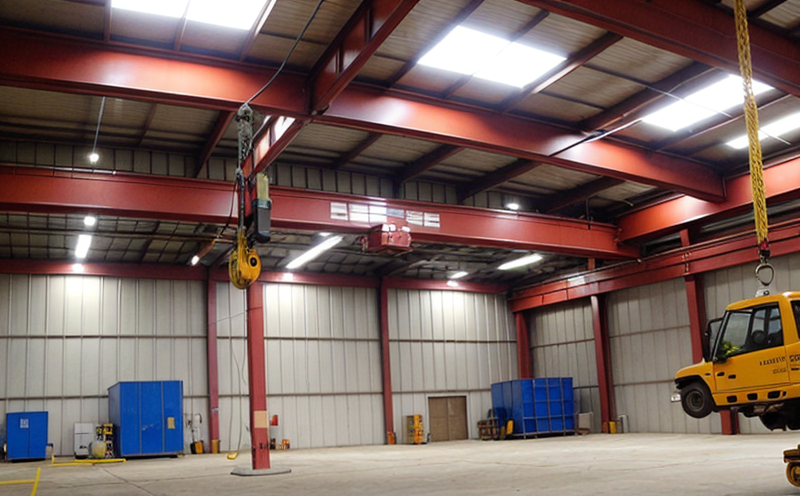Overhead Crane Periodic Inspection
The periodic inspection of overhead cranes is a critical component in ensuring safe and efficient operation within industrial settings. Overhead cranes are used across various sectors including manufacturing, construction, and warehousing to move heavy loads with precision and reliability. These inspections ensure the structural integrity, operational safety, and compliance with relevant standards.
Periodic inspections of overhead cranes follow a structured process that includes visual examinations, functional tests, and detailed assessments. The primary purpose is to identify any potential issues before they escalate into costly or dangerous failures. This service aims not only at maintenance but also at ensuring the longevity of equipment, reducing downtime, and maintaining compliance with international safety regulations.
The inspection typically covers several key areas:
- Visual Inspection: Checking for visible signs of wear, corrosion, or damage on all components including hooks, hoists, rails, and control systems.
- Mechanical Testing: Performing load tests to ensure the crane can handle its rated capacity safely.
- Instrumentation Checks: Ensuring that safety devices such as limit switches, overloads, and emergency stop mechanisms are functioning correctly.
- Electrical Systems: Verifying the integrity of electrical connections and components to prevent short circuits or fires.
The frequency of inspections can vary based on factors like crane type, usage intensity, environmental conditions, and regulatory requirements. For instance, cranes operating in harsh environments such as maritime terminals or outdoor steel fabrication plants may require more frequent checks compared to those used indoors under controlled conditions.
Compliance with international standards is paramount for this service. Notable standards include ISO 4302:1986 and IEC 60252-7, which provide guidelines on the design and testing of overhead cranes. Additionally, local regulations such as those enforced by OSHA (Occupational Safety and Health Administration) in the United States or similar bodies globally must be adhered to.
The expertise of Eurolab personnel ensures that these inspections are conducted with precision and thoroughness. Our team comprises certified professionals who possess extensive experience in industrial equipment maintenance and safety compliance.
Applied Standards
The periodic inspection of overhead cranes is governed by several international standards designed to ensure the highest level of safety and reliability. These include:
- ISO 3181-2:2016 - This standard provides guidelines for the calculation of safe working loads (SWL) in lifting equipment.
- IEC 60252-7 - Focuses on the design and testing of cranes, providing specifications for various aspects including structure and drive systems.
- OSHA Regulations - In the U.S., these regulations mandate periodic inspections to ensure compliance with safety standards.
The application of these standards ensures that all components of the overhead crane are evaluated against internationally recognized benchmarks, thereby enhancing overall safety and operational efficiency.
Eurolab Advantages
At Eurolab, we pride ourselves on delivering exceptional services tailored to meet your specific needs. Our periodic inspection service for overhead cranes offers several unique advantages:
- Comprehensive Assessment: Our inspectors provide a thorough examination of every critical component ensuring no detail is overlooked.
- Expertise and Experience: Eurolab’s team includes some of the most experienced professionals in industrial equipment inspection, bringing a wealth of knowledge to each project.
- Customized Solutions: We understand that not all cranes are identical; thus, our services are tailored to suit your particular requirements ensuring maximum effectiveness.
- State-of-the-Art Equipment: Utilizing cutting-edge technology allows us to identify potential issues early on, minimizing risk and maintenance costs.
- Dedicated Reporting: Clear and concise reports that not only summarize findings but also provide recommendations for necessary actions.
Our commitment to excellence ensures that you receive reliable results every time. By choosing Eurolab, you can rest assured knowing your equipment is in the hands of experts who care about delivering top-notch service.
Environmental and Sustainability Contributions
The periodic inspection of overhead cranes plays a pivotal role in promoting environmental sustainability by ensuring that industrial operations remain efficient and safe. Here are some ways this service contributes:
- Energy Efficiency: By identifying inefficiencies early on, we help prevent unnecessary energy consumption.
- Material Reduction: Through timely inspections, potential accidents can be avoided which might otherwise lead to material losses or waste.
- Resource Optimization: Ensuring that equipment operates optimally helps extend its lifespan, thus optimizing resource use over time.
- Emissions Control: With safer and more efficient operations, the overall environmental impact is minimized.
Incorporating sustainable practices into our inspection processes not only benefits immediate operational needs but also contributes positively to long-term ecological health. By choosing Eurolab for your periodic inspections, you contribute towards creating a greener future while ensuring the best possible performance from your overhead cranes.





